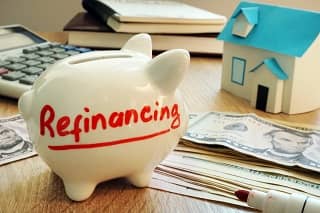 If you own a condominium and want to refinance your mortgage, you'll need to meet two sets of loan guidelines: one that applies to you and another that applies to your condo owners' association.
If you own a condominium and want to refinance your mortgage, you'll need to meet two sets of loan guidelines: one that applies to you and another that applies to your condo owners' association.
The rules for you are essentially the same regardless of the property type, but the rules for your association can create issues when refinancing your loan, says Joe Metzler, a mortgage specialist with Mortgages Unlimited in St. Paul, Minn.
The first issue is whether your condo has been approved for conventional (Fannie Mae or Freddie Mac) or FHA financing. Approval is required because your association is essentially a third-party involved in refinancing your loan and that involvement adds "an additional element of risk" for the lender, Metzler explains.
If it is approved, your condo refinance can go forward. If not, you'll probably need to get approval before you can proceed. The process is "actually fairly easy," Metzler says, if, that is, your association's financials are in OK shape and your neighbors don't include legions of foreclosures or non-owner occupied rental units. If not, approval could be difficult or impossible, which would derail your condo refinance.
Condo questionnaire
The lender also will require a so-called condominium questionnaire. The most important questions typically concern the percentage of owners who occupy their units, association reserve accounts and whether the association is involved in any litigation, according to Justin Lopatin, vice president of mortgage lending at PERL Mortgage in Chicago, Ill.
"Most of the time, there needs to be over 51 percent owner-occupancy in the building," Lopatin explains. "If there is a shortage of reserves or, typically, 15 percent of the unit owners are past due on their association dues or assessment fees, that can be a hindrance."
The FHA recently relaxed its guidelines to allow up to 15 percent of the owners to be 60 or more days delinquent. Previously, the guidelines used a 30-day threshold.
Appraisal comps
Another issue concerns how much equity you have in your condo. Equity is a function of your loan amount and the value of your property, and is usually determined by some form of an appraisal. An appraisal can prove problematic if condos similar to yours were sold within the last six months at prices that don't support your loan amount.
"Historically, we've always had three comparables on an appraisal," Metzler explains. "Today, you see four or five a lot. But when you're doing (a loan for a property) in an association, you have to pull the majority of the comps out of that same project."
That means the appraiser will have to use at least two or three comps in your complex to determine the value of your condo, even if other similar condos sold for higher prices nearby. If no usable comps exist in your complex, the appraiser will have to justify why other comps were used.
Rented out
If you've moved out of your condo, the rules change because, as Lopatin explains, your loan will be considered an investment refinance. That means your interest rate likely will be higher and you'll need at least 20 percent equity to refinance. Equity is a must because mortgage insurance generally isn't an option for non-owner-occupied properties.
If you're short of equity, you can do what's known as a cash-in refinance, in which you bring cash to closing to boost your equity to the 20 percent level.
"It may make sense to take $10,000 or $20,000 out of your savings -- from one pocket, so to speak, to another -- to increase the cash flow and make that investment property more profitable," Lopatin says. "That's a great strategy if it's within reach and you have the liquidity. Not everybody does."
The bottom line is that a condo refinance involves a lot of moving parts, but you might be able to pull it off if you and your association meet the guidelines.
This article was revised by Keith Gumbinger.
Related links :
- How to buy a condo
- Calculator: Should I refinance my mortgage?
- See Lots more help on refinancing from HSH.com



